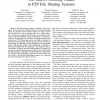Free Online Productivity Tools
i2Speak
i2Symbol
i2OCR
iTex2Img
iWeb2Print
iWeb2Shot
i2Type
iPdf2Split
iPdf2Merge
i2Bopomofo
i2Arabic
i2Style
i2Image
i2PDF
iLatex2Rtf
Sci2ools
INFOCOM
2006
IEEE
2006
IEEE
The Index Poisoning Attack in P2P File Sharing Systems
— P2P file-sharing systems have indexes, which users search to find locations of desired titles. In the index poisoning attack, the attacker inserts massive numbers of bogus records into the index for a set of targeted titles. As a result, when a user searches for a targeted title, the index returns bogus results, such as bogus file identifiers, bogus IP addresses, or bogus port numbers. In this paper we first show that both structured and unstructured P2P file-sharing systems are highly vulnerable to the index poisoning attack. We then develop a novel and efficient methodology for estimating index poisoning levels and pollution levels in file-sharing systems. The methodology is efficient in that involves neither the downloading nor the analysis of binary content files. We deploy data-harvesting platforms for FastTrack, an unstructured file-sharing system, and Overnet, a DHT-based file-sharing system. Applying our methodology to harvested data, we find that index poisoni...
| Added | 11 Jun 2010 |
| Updated | 11 Jun 2010 |
| Type | Conference |
| Year | 2006 |
| Where | INFOCOM |
| Authors | Jian Liang, Naoum Naoumov, Keith W. Ross |
Comments (0)

